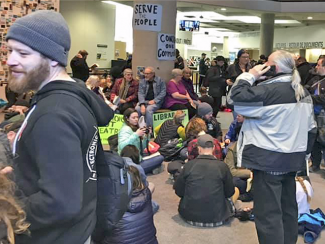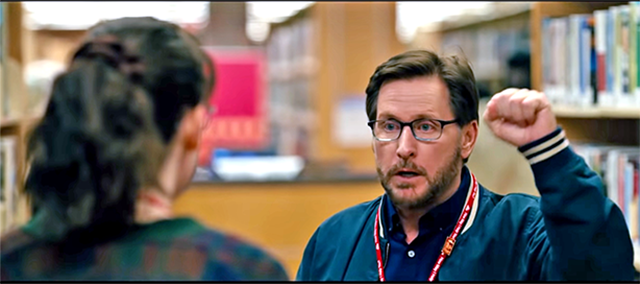UNQUIET PLEASE
Winnipeg library plans comfort zone for homeless

Millennium For All rally at Winnipeg main library
THEY DID IT WITHOUT NAKED LIBRARIANS. The Millennium Library in Winnipeg will soon add social workers, a crisis support centre, and free snacks and drinks to it’s services. The decision was a response to significant public pressure—but nothing like the kind used by protesters in the recent Hollywood movie The Public.
In the movie, the public goes to the extreme of naked protest to force administrators to allow a big city library to become a refuge and support for the homeless. The movie is fiction. But the issue of how best to use our libraries is not.
More than a place to store books
The Millennium Library wants to convert a shuttered coffee shop on its ground floor into a crisis centre to help people cope with homelessness, drug addiction, mental health issues, and other problems. It has asked the city for $260,000 to fund the project.
Library services manager Ed Cuddy hopes the two year pilot project will allow the library to serve the local community more effectively.
“If you walked downtown, you’ll trip over a coffee shop. There’s many opportunities to get coffee,” explained Cuddy. “But for us to be able to have crisis workers here working with the community [and] be providing free coffee to people who could use it — I think is a much better use of this space.”
Activists hope that the library’s community-friendly decision will lead to a more positive engagement with the local community. Last year, Millennium Library management decided to impose airport-style security checks on library users. The move triggered strong protest. Community activists created the “MIllenium for All” campaign to press for removal of the security barriers.

A librarian takes a stand with the homeless in the movie The Public
Barriers need to come down
“Millennium for All” is “cautiously optimistic” about the proposed crisis support centre, according to Joe Kurnow, a member of the group. But on its Facebook page, the activists stress the importance of the library removing its security controls if it wants to be an open and accessible space for all members of the local community.
Last fall, the group pointed to figures showing that the number of people using the library had dropped by 25 percent compared to the same time a year earlier. This decline coincided with the introduction of the security checks.
“Millennium for All” has also been campaigning at city council meetings to get the barriers removed. In a report presented to the city council last year, it noted that the library should be a “robust, diverse public space that welcomes all community members’ leadership and attendance.”
The city council says part of the problem is that the province has not lived up to its funding commitments. The city says the province owes the city $1.6 million in funding. These funds could allow the library to hire more support staff, which may help remove the need for strict security checks.
‘Begin from a place of respect’
Winnipeg’s Millennium is just one public library that’s being called on to take direct action to help people survive in our inner cities.
Calgary Central Library has developed ties with local social services to support patrons cope with health and social problems. Together, they established a supervised drug site nearby that allows people to do drugs with trained staff on hand. The site prevented 750 overdoses during its first year of operation.
Calgary Central also made some design changes to try and cut down on violent behaviour. For example, it placed a repurposed fire truck near the entrance to serve as an early learning centre.
“That really changed the dynamic of this space,” commented director of service delivery Sarah Meilieur. “It was something that drove people there and it made it a really difficult place for inappropriate activity to take place, because all of a sudden the main floor was filled with children and families on a daily basis.”
In Halifax, the central library took a different approach. It managed to obtain food grants to provide hot drinks and healthy snacks to patrons each morning. Chief librarian Asa Kachan believes that this welcoming gesture helps everyone to feel respected.
“It’s not to say that difficult situations never arise, but if we begin from a place of respect, then we work really hard to sort of … get ahead of some of the difficult circumstances,” she added.
“Knowing people by name, providing some food, means that if we do need to have a conversation with somebody and say, ‘You know, your behavior is really disruptive … time to head out for a little walk and see if you can sort of cool down,’ that’s done in the tone of respect, not exclusion.”
Trailer for the movie The Public
- 30 -













Add new comment